江苏省无锡市2019-2020学年第二学期牛津译林版8BUnit 1 Past and Present单元提高卷(word版含答案)
文档属性
| 名称 | 江苏省无锡市2019-2020学年第二学期牛津译林版8BUnit 1 Past and Present单元提高卷(word版含答案) | 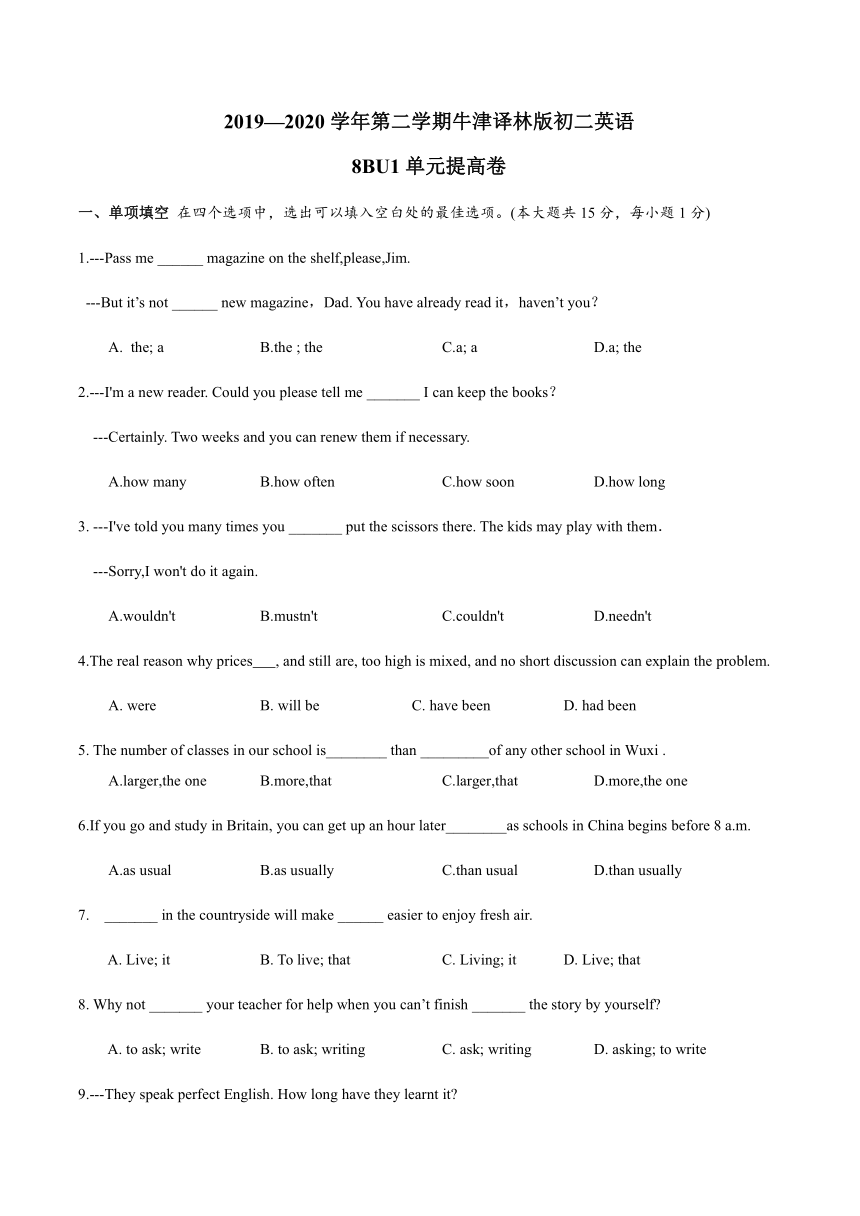 | |
| 格式 | zip | ||
| 文件大小 | 96.5KB | ||
| 资源类型 | 教案 | ||
| 版本资源 | 牛津译林版 | ||
| 科目 | 英语 | ||
| 更新时间 | 2020-02-13 15:41:11 | ||
图片预览

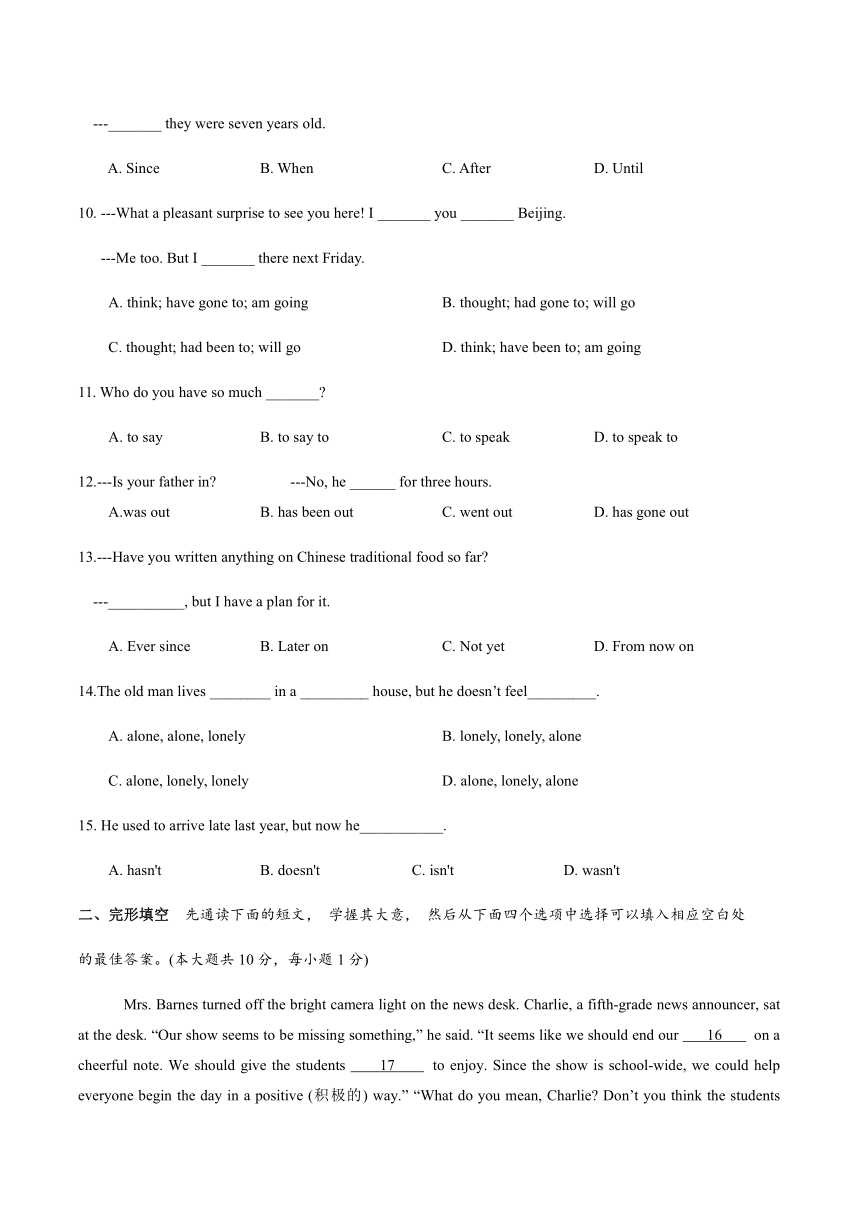
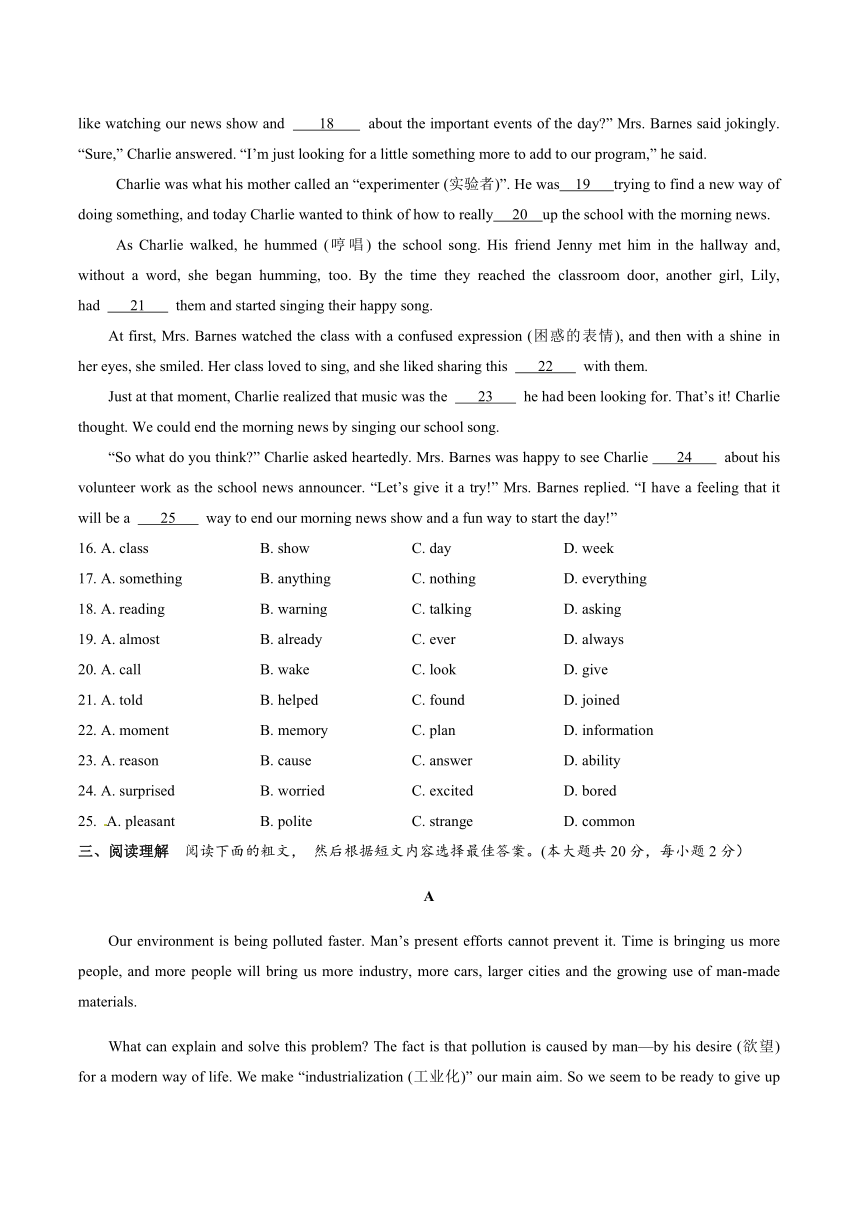
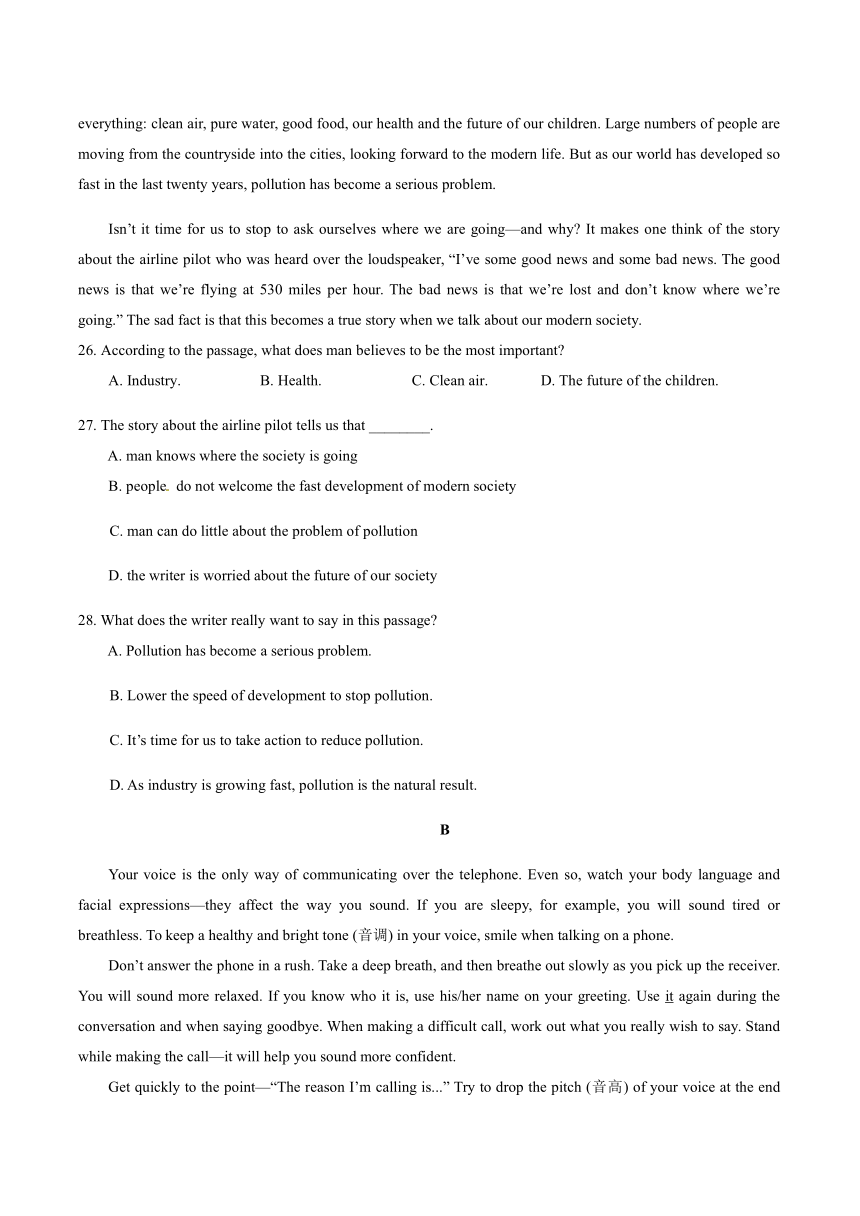
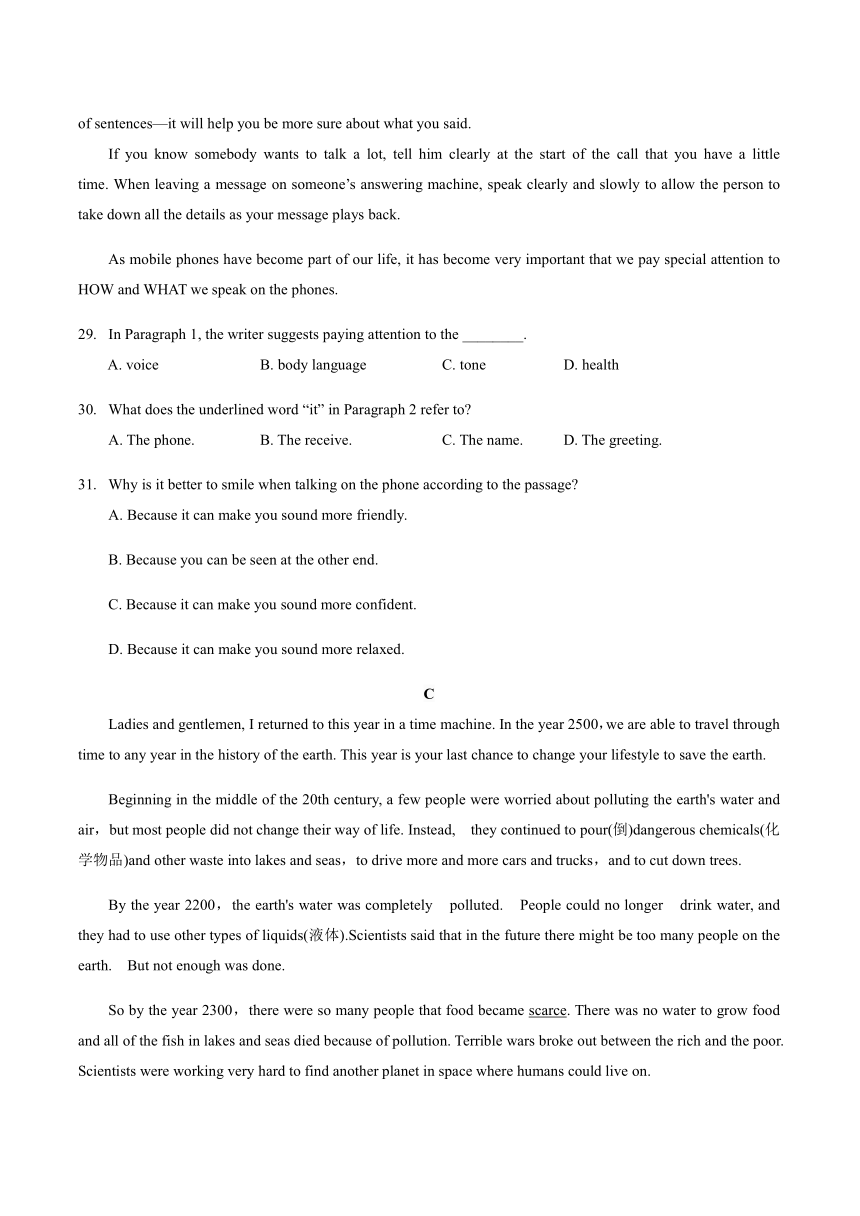
文档简介
2019—2020学年第二学期牛津译林版初二英语
8BU1单元提高卷
一、单项填空 在四个选项中,选出可以填入空白处的最佳选项。(本大题共15分,每小题1分)
1.---Pass me ______ magazine on the shelf,please,Jim.
---But it’s not ______ new magazine,Dad. You have already read it,haven’t you?
A. the; a B.the ; the C.a; a D.a; the
2.---I'm a new reader. Could you please tell me _______ I can keep the books?
---Certainly. Two weeks and you can renew them if necessary.
A.how many B.how often C.how soon D.how long
3. ---I've told you many times you _______ put the scissors there. The kids may play with them.
---Sorry,I won't do it again.
A.wouldn't B.mustn't C.couldn't D.needn't
4.The real reason why prices , and still are, too high is mixed, and no short discussion can explain the problem.
A. were B. will be C. have been D. had been
5. The number of classes in our school is________ than _________of any other school in Wuxi .
A.larger,the one B.more,that C.larger,that D.more,the one
6.If you go and study in Britain, you can get up an hour later________as schools in China begins before 8 a.m.
A.as usual B.as usually C.than usual D.than usually
7. _______ in the countryside will make ______ easier to enjoy fresh air.
A. Live; it B. To live; that C. Living; it D. Live; that
8. Why not _______ your teacher for help when you can’t finish _______ the story by yourself?
A. to ask; write B. to ask; writing C. ask; writing D. asking; to write
9.---They speak perfect English. How long have they learnt it?
---_______ they were seven years old.
A. Since B. When C. After D. Until
10. ---What a pleasant surprise to see you here! I _______ you _______ Beijing.
---Me too. But I _______ there next Friday.
A. think; have gone to; am going B. thought; had gone to; will go
C. thought; had been to; will go D. think; have been to; am going
11. Who do you have so much _______?
A. to say B. to say to C. to speak D. to speak to
12.---Is your father in? ---No, he ______ for three hours.
A.was out B. has been out C. went out D. has gone out
13.---Have you written anything on Chinese traditional food so far?
---__________, but I have a plan for it.
A. Ever since B. Later on C. Not yet D. From now on
14.The old man lives ________ in a _________ house, but he doesn’t feel_________.
A. alone, alone, lonely B. lonely, lonely, alone
C. alone, lonely, lonely D. alone, lonely, alone
15. He used to arrive late last year, but now he___________.
A. hasn't B. doesn't C. isn't D. wasn't
二、完形填空 先通读下面的短文, 学握其大意, 然后从下面四个选项中选择可以填入相应空白处
的最佳答案。(本大题共10分,每小题1分)
Mrs. Barnes turned off the bright camera light on the news desk. Charlie, a fifth-grade news?announcer, sat at the desk. “Our show seems to be missing something,” he said. “It?seems like we should end our?? ?16 ?? on a cheerful note. We should?give the students?? ?17 ?? to?enjoy. Since the show is?school-wide, we could help everyone begin the day in a positive (积极的) way.” “What do you mean, Charlie? Don’t you think the students like watching our news show and ? ?18 ?? about the important events of the day?” Mrs. Barnes said jokingly. “Sure,” Charlie?answered. “I’m just looking for a little something more to add to our program,” he said.
Charlie was what his mother called an “experimenter (实验者)”. He was 19 ??trying to find a new?way of doing something, and today Charlie wanted to think of how to really ?20 up the school?with the morning news.
As Charlie walked, he hummed (哼唱) the school song. His friend Jenny met him in the?hallway and, without a word, she began humming, too. By the time they reached the classroom door, another girl, Lily, had ? ?21 ?? them and started singing their happy song.
At first, Mrs. Barnes watched the class with a confused expression (困惑的表情), and then with a shine?in her?eyes, she smiled. Her class loved to sing, and she liked sharing this ? ?22 ?? with them.
Just at that moment, Charlie realized that music was the ? ?23 ?? he had been looking for.?That’s it! Charlie thought. We could end the morning news by singing our school song.
“So what do you think?” Charlie asked heartedly. Mrs. Barnes was happy to see Charlie?? ?24 ?? about his volunteer work as the school news announcer. “Let’s give it a try!” Mrs. Barnes?replied. “I have a feeling that it will be a ? ?25 ?? way to end our morning news show and a fun way?to start the day!”
16. A. class B. show C. day D. week
17. A. something B. anything C. nothing D. everything
18. A. reading B. warning C. talking D. asking
19. A. almost B. already C. ever D. always
20. A. call B. wake C. look D. give
21. A. told B. helped C. found D. joined
22. A. moment B. memory C. plan D. information
23. A. reason B. cause C. answer D. ability
24. A. surprised B. worried C. excited D. bored
25. A. pleasant B. polite C. strange D. common
三、阅读理解 阅读下面的粗文, 然后根据短文内容选择最佳答案。(本大题共20分,每小题2分)
A
Our environment is being polluted faster. Man’s present efforts cannot prevent it. Time is bringing us more people, and more people will bring us more industry, more cars, larger cities and the growing use of man-made materials.
What can explain and solve this problem? The fact is that pollution is caused by man—by his desire (欲望) for a modern way of life. We make “industrialization (工业化)” our main aim. So we seem to be ready to give up everything: clean air, pure water, good food, our health and the future of our children. Large numbers of people are moving from the countryside into the cities, looking forward to the modern life. But as our world has developed so fast in the last twenty years, pollution has become a serious problem.
Isn’t it time for us to stop to ask ourselves where we are going—and why? It makes one think of the story about the airline pilot who was heard over the loudspeaker, “I’ve some good news and some bad news. The good news is that we’re flying at 530 miles per hour. The bad news is that we’re lost and don’t know where we’re going.” The sad fact is that this becomes a true story when we talk about our modern society.
26. According to the passage, what does man believes to be the most important?
A. Industry. B. Health. C. Clean air. D. The future of the children.
27. The story about the airline pilot tells us that ________.
A. man knows where the society is going
B. people do not welcome the fast development of modern society
C. man can do little about the problem of pollution
D. the writer is worried about the future of our society
28. What does the writer really want to say in this passage?
A. Pollution has become a serious problem.
B. Lower the speed of development to stop pollution.
C. It’s time for us to take action to reduce pollution.
D. As industry is growing fast, pollution is the natural result.
B
Your voice is the only way of communicating over the telephone. Even so, watch your body language and facial expressions—they affect the way you sound. If you are sleepy, for example, you will sound tired or breathless. To keep a healthy and bright tone (音调) in your voice, smile when talking on a phone.
Don’t answer the phone in a rush. Take a deep breath, and then breathe out slowly as you pick up the receiver. You will sound more relaxed. If you know who it is, use his/her name on your greeting. Use it again during the conversation and when saying goodbye. When making a difficult call, work out what you really wish to say. Stand while making the call—it will help you sound more confident.
Get quickly to the point—“The reason I’m calling is...” Try to drop the pitch (音高) of your voice at the end of sentences—it will help you be more sure about what you said.
If you know somebody wants to talk a lot, tell him clearly at the start of the call that you have a little time.?When leaving a message on someone’s answering machine, speak clearly and slowly to allow the person to take down all the details as your message plays back.
As mobile phones have become part of our life, it has become very important that we pay special attention to HOW and WHAT we speak on the phones.
29. In Paragraph 1, the writer suggests paying attention to the ________.
A. voice B. body language C. tone D. health
30. What does the underlined word “it” in Paragraph 2 refer to?
A. The phone. B. The receive. C. The name. D. The greeting.
31. Why is it better to smile when talking on the phone according to the passage?
A. Because it can make you sound more friendly.
B. Because you can be seen at the other end.
C. Because it can make you sound more confident.
D. Because it can make you sound more relaxed.
C
Ladies and gentlemen, I returned to this year in a time machine. In the year 2500,we are able to travel through time to any year in the history of the earth. This year is your last chance to change your lifestyle to save the earth.
Beginning in the middle of the 20th century, a few people were worried about polluting the earth's water and air,but most people did not change their way of life. Instead, they continued to pour(倒)dangerous chemicals(化学物品)and other waste into lakes and seas,to drive more and more cars and trucks,and to cut down trees.
By the year 2200,the earth's water was completely polluted. People could no longer drink water, and they had to use other types of liquids(液体).Scientists said that in the future there might be too many people on the earth. But not enough was done.
So by the year 2300,there were so many people that food became scarce. There was no water to grow food and all of the fish in lakes and seas died because of pollution. Terrible wars broke out between the rich and the poor. Scientists were working very hard to find another planet in space where humans could live on.
By the year 2400,the air was too polluted for humans to breathe. So we had to leave the earth. But only the rich were able to leave. Where did we go? Nowhere. You see scientists did not find another safe planet,so now we must travel around the universe in our space ships. We are still looking for a place to call our home.
So it is up to you to change history. There is still hope. You must change your lifestyle now, before it is too late.
32 .Which problem is NOT talked about in Paragraph2?
A. Water. B. Air. C. Lifestyle. D. Food.
33. The underlined word "scarce" means " ".
A.昂贵的 B.充足的 C.缺乏的 D.特殊的
34. Which of the following is NOT true?
A. Only a few people changed their lifestyle in the 20th century.
B. There was no clean water for people to drink by the year 2200.
C. All the fish died because of the pollution by the year 2300.
D. We found a new home in another planet by the year 2400.
35. What's the best title of the passage?
A. Stop polluting B. Change or leave
C. Look for new home D. Return to the earth
第II卷(非选择题,共40分)
四、单词拼写 (本大题共10分,每小题1分)
(A)根据句意和汉语注释,写出单词的正确形式。
1. Many of my classmates plan to go___________(去国外) for further education in the future.
2.I’ll be in______________(交流)with Mr Wang about the coming Chinese Character Dictation Competition.
3. The people in area now have a better___________(环境) than before.
4.We are happy to know that all the people are in good__________(状况) after the terrible snowstorm.
5. Millie is_____________(采访) Mr Black about the community's past and present.
(B)根据句意,用括号内所给单词的适当形式填空。
6. In order to protect the environment, lots of____________ (factory)have been moved away from the people's living areas in the city.
7. How poor these husbands are! They have to stay here to look after their __________ (wife) bags.
8. Waste water from the factory is the main cause of the___________(pollute) of local rivers.
—Yes, we need more time.
9. It seems__________ (possible) for Spring Festival Gala to satisfy(满足)all 1.3 million Chinese.
10. The story happened__________(century) ago, so few people know about it.
五、动词填空 用括号内所给动词的适当形式填空。(本大题共10分,每小题1分)
1. Last week, Mr. Li was badly hurt in the traffic accident. He__________(lie)in bed since then.
2. Tommy can’t ride the bike to school because he__________ (lose) the key to his bicycle.
3. Amy promised to chat with me on the Internet, but so far she_____________(not do)it.
4. —How many times__________the twins__________ (visit) Shanghai Disneyland?
—Twice.
5. Don't worry. Jackson is quite used to__________(drive) in such busy streets.
6. We should prevent them__________(put) the waste into the lake. It will kill the fish and plants.
7. Nobody____________(lend)money to the girl, has he?
8. Li Hua __________(collect)more than 1000 old clocks and watches in the past 5 years.
9. Daniel’s parents___________(take) him to the USA if he does well in all his subjects.
10. This is the second time that I__________(leave) the key at home.
六、完成下列句子 按所给的汉语, 用英语完成下列句子。(本大题共10分,每小题2分)
1. 这些年你们彼此怎样保持联系的?
How have you________________________________________________over the years?
2. 我们可以从这本书中更多地了解无锡的现在和过去。
From the book, we can_______________________________________________________.
3. 过去从无锡坐火车去北京常要花上十个多小时。
It_______________________________________________________to Beijing from Wuxi.
4. 我们已经很久没有见面了,但是会不时地通过邮件来交流。
We haven’t seen each other for a longtime, but we can______________________________.
5. 不仅我爸爸,而且我妈妈也从未去国外旅行过。
Not only my father __________________________________________________________.
七、任务型阅读 (本大题共5分,每空1分)
British people pride themselves on their polite manners towards one another in public. They often use the word “sorry”— even when they don’t really mean it! Usually, if they want to ask a stranger for the time, they would start by saying “Sorry to bother you. Do you know what time it is?” If they’re five minutes late for an appointment (约会), they would generally greet the person by saying “Sorry I’m late!”
They use the word “sorry” in so many different situations that the meaning of the word has changed a little over time. The two main dictionary definitions (释义) of “sorry” are: 1) feeling sad for someone else because of their problems or bad luck; 2) feeling regret because you’ve done something wrong. Now, think about this. Normally, when they want to ask a stranger a question, they start with “Sorry to bother you”. In this situation, they aren’t saying sorry because they don’t feel happy for that person or because they feel regret.
So what does “sorry” really mean? And why do British people use it so much? Well, in the British culture, saying “sorry” is a way to be polite, especially to people who they don’t know very well. It’s also a very clever way to get what they want. In a recent experiment, an actor went up to different strangers on a rainy day to ask if he could use their mobile phones in order to make a call. When he went up to one group of strangers and asked them without saying “sorry” first, he was only 9 per cent successful in borrowing their phones. However, when he said “sorry” to another group of strangers about the bad weather before asking if he could use their mobile phones, he was 47 per cent successful. So maybe saying “sorry” is not just being polite, but it is also a good method to get what they want too!
Title: Why do British people say sorry?
Main points Detailed information
The 1 in which they say “sorry” asking for the timebeing late for an appointment
The change of the meaning of “sorry” The two main dictionary definitions of “sorry”: ①feeling sad for others’ problems or bad luck ②feeling regret because of one’s own 2 When British people ask a stranger a question by starting with “sorry”, they are saying sorry neither because they feel _3_______ for that person nor because they feel regret.
The 4 meaning of “sorry” a way to be politea good way to get what they wantThe result of a __5_______ experiment shows it’s easier for one to succeed in borrowing a mobile phone by saying “sorry”.
八、书面表达 (本大题共10分)
假设你是悉尼大学一名华裔学生,名叫Jason Wu。你从China Daily土看到该报正在开展主题为Change for a Better China的环保讨论活动。你打算结合自己所居住的小镇的变化,给报社写一封英文信参与讨论。内容提示见下表:
注意事项:
1. 英文信须包括表格中所有提示内容,要求语句通顺、意思连贯;
2. 表格中“感想建议”一栏须用2-3句话展开合理想象,作适当发挥;
3. 词数在90个左右,信的首尾己在答题卡上给出,不计入总词数;
4. 信件内容必须写在答题卡指定的位置上。
小镇概况 Hartwell,人口约5,000,“澳洲最美小镇”之一
过去状况 当地入冬天燃木取暖,引起空气污染、树木被伐
应对措施 立法阻止此类活动,鼓励使用清洁能源
感想建议 ……
参考词汇:
澳洲最美小镇(Australia's Nicest Towns) 清洁能源(clean energy)
________________________________________________________________________________________________________________________________________________________________________________________________________________________________________________________________________________________________________________________________________________________________________________________________________________________________________________________________________________________________________________________________________________________________________________________________________________________________________________________________________________________________________________________________________________________________________________________________________________________________________________________________________________________________________________________________________________________________________________________________________________________________________________________________________________________________________________________________________________
参考答案
单项选择ADBAC CCCAB BBCCB
完形填空BACDB DACCA
阅读理解ADC BCA DCDA
单词拼写
abroad communication environment condition interviewing
factories wives’ pollution impossible centuries
动词填空
has lain has lost hasn’t done have visited driving
putting lent has collected will take have left
完成句子
kept in touch with each other
learn more about Wuxi’s present and past
used to take over ten hours to take a train
communicate by email from time to time
but also my mother has never travelled abroad
任务型阅读
1.situations 2.mistakes 3.sad 4.real 5.recent
书面表达 One possible version
Dear Sir/Madam,
I have recently saw a discussion activity in China Daily, whose topic is Change For a Better China, so I'm writing to tell you something about the change of my village.
My little village Hartwell, whose population is about 5 , 000 is titled one of "Australia's Nicest Towns". However, it was not so beautiful in the past , the local residents there used to cut down trees to make fires which caused air pollution. To improve the situation, the local government made laws to ban these harmful activities and encourage clean energy. From then on, the pollution had been decreased a lot and our small village had become more and more beautiful.
In my opinion, you should also take measures to encourage people to protect the environment. After all, a good environment and less pollution are beneficial to our health
Yours,
Jason Wu
